- Trade, trade, glorious trade! First gameplay video of Europa Universalis IV highlights new trade system
- Europa Universalis IV Q&A, with Thomas Johansson
- The World that May Have Been, a Europa Universalis IV Let’s Play — Part 1: Never Pick on Someone Your Own Size
- The World that May Have Been, a Europa Universalis IV Let’s Play — Part 2: The Best of Times, the Worst of Times
- The World that May Have Been, a Europa Universalis IV Let’s Play — Part 3: If You Can’t Beat Them…
- The World That May Have Been, a Europa Universalis IV Let’s Play – Part 4: The Death and Rebirth of the British Empire
- The World That May Have Been, a Europa Universalis IV Let’s Play – Part 5 (FINAL): Bend with the Wind
- Europa Universalis IV: The Verdict
- Ayutthaya Universalis: Building an Empire in Southeast Asia
- The Qing in the North: Reflections on Europa Universalis IV: Art of War
- Let’s Play EU4: Common Sense! Part 1: Welcome to Meiguo
- Let’s Play EU4: Common Sense! Pt 2: East Meets West
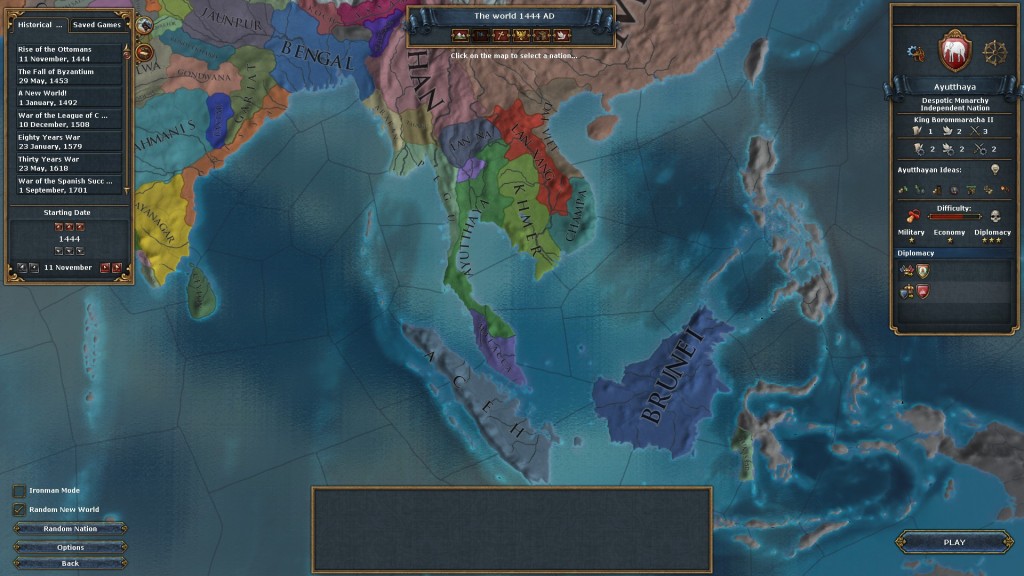
The Kingdom of Ayutthaya was the major power in Southeast Asia in the 14th and 15th centuries. Based in the capital of Ayutthaya on the Chao Phraya River, this decentralized Thai kingdom managed to exercise hegemony over the area for many years. Trade rivalry with Malacca and constant wars with neighboring Burmese and Khmer kingdoms typified the history.
At the start of Europa Universalis IV, Ayutthaya is a big fish in a small pond. As the largest and strongest state in Southeast Asia, it is still a minnow compared to Ming China and the eventual European invaders. Over the 350 years of the game, I set out to change this. With patience, luck, and the odd save/reload, I succeeded:
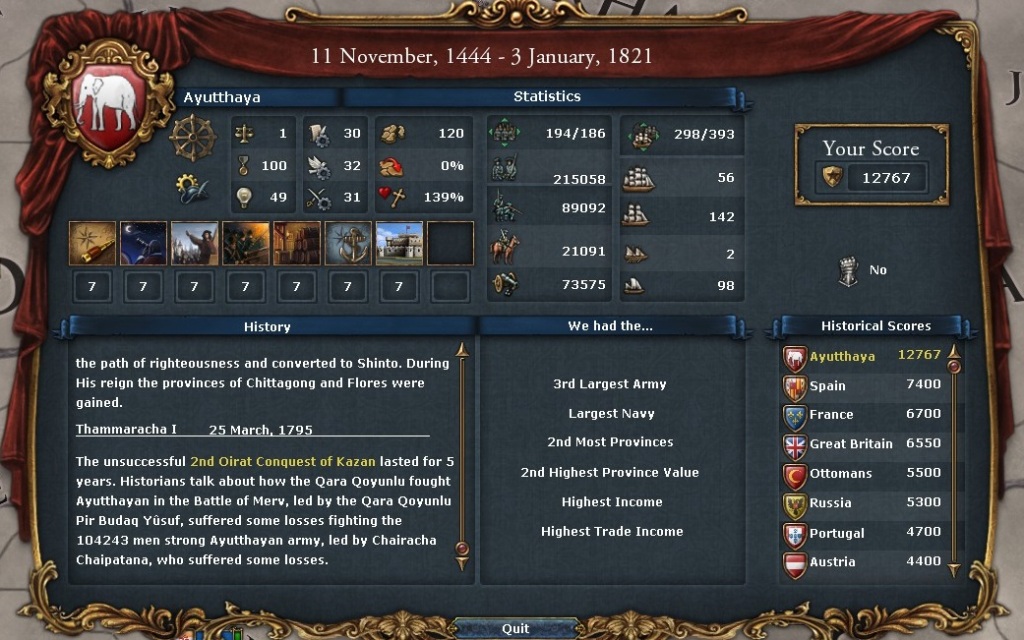
My journey took me from Southeast Asian minor to Asian power; from an Asian power to the Asian power; and from Asian hegemon to one of the world’s Great Powers. This was one occasion when EU4 shone as an “empire-building game”, and I’ve given some thought as to why.
The starting point lies in EU4’s (and, by extension, the entire Europa Universalis series’s) choice of subject. Every Paradox game is about the struggle for power: Crusader Kings is about the struggle between individuals, Victoria is about struggle between states and struggle within states, and Hearts of Iron and Europa Universalis are almost entirely about the struggle between states. The player’s tools in EU4 reflect that focus: you fight wars, colonise territory, befriend (or antagonise) other states, send out explorers, merchants, and trade fleets, and unlock bonuses via technology or National Ideas. Other aspects of the period are abstracted or, in the case of the emerging gap between European and non-European powers, taken for granted.
This works better for some parts of the world than others. In particular, this works best in regions divided into multiple, roughly even states, such as Western Europe – and Southeast Asia 1. Even as the largest and strongest Southeast Asian state, my Ayutthaya was still only first amongst equals. A two-front war or an opposing alliance could have stopped me. To thrive, I had to deploy every tool I had: diplomacy, to keep my northern neighbours happy while I campaigned in the south; colonisation, to build up my land, manpower, and revenue base; trade, because the nearby Malacca trade node is a motherlode 2; and ultimately, conquest, because I wanted the wealth of Malacca all to myself. After a few decades, the map looked like this (note that my colonisation had only just begun):
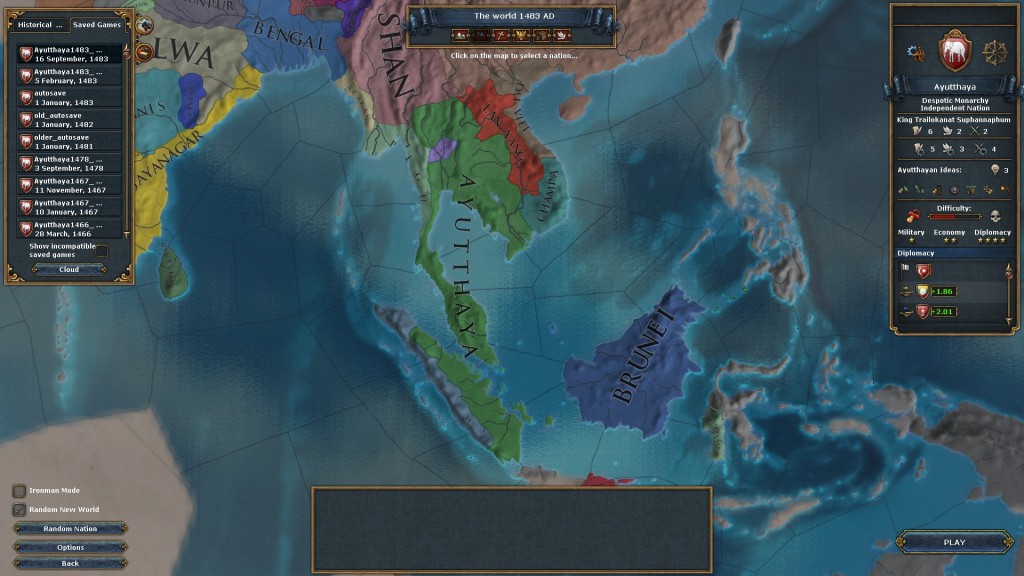
By the late 1500s, I dominated Southeast Asia, and the game was becoming a little dull. Trade and colonisation were ticking along, and my explorers had already made it as far as Africa and the New World:
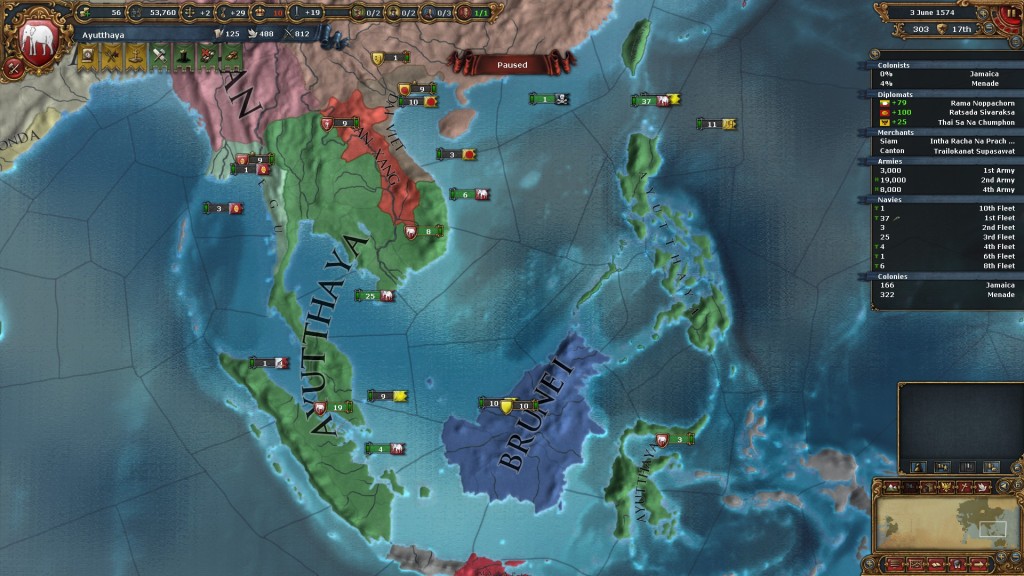
And then, it became exciting. In 1588, rival alliances took me into a war with Ming. By its end, Ayutthayan armies – with help from smaller allies such as Dai Viet – had driven out the invading Ming and sacked their capital, Nanjing. In the peace settlement, I claimed the city of Hangzhou, a stone’s throw from Nanjing. In game terms, Hangzhou gave a bonus to trade power, which helped me siphon trade towards Malacca:
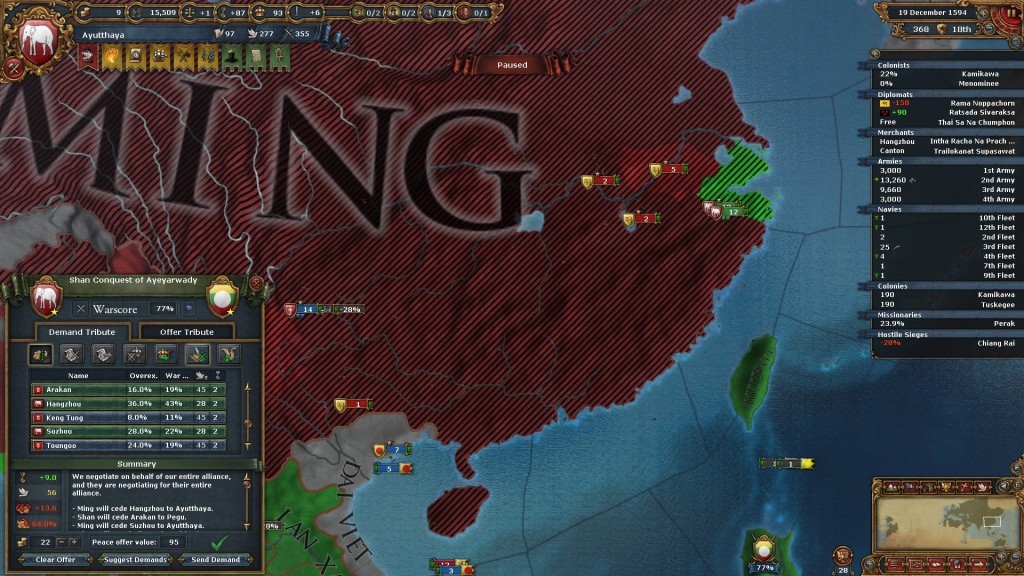
In the final two centuries of the game (1600-1821), I forged Ayutthaya into the equal of any European empire. As early as 1684, I could defeat Portugal – although their superior technology meant I had to swarm them 3:
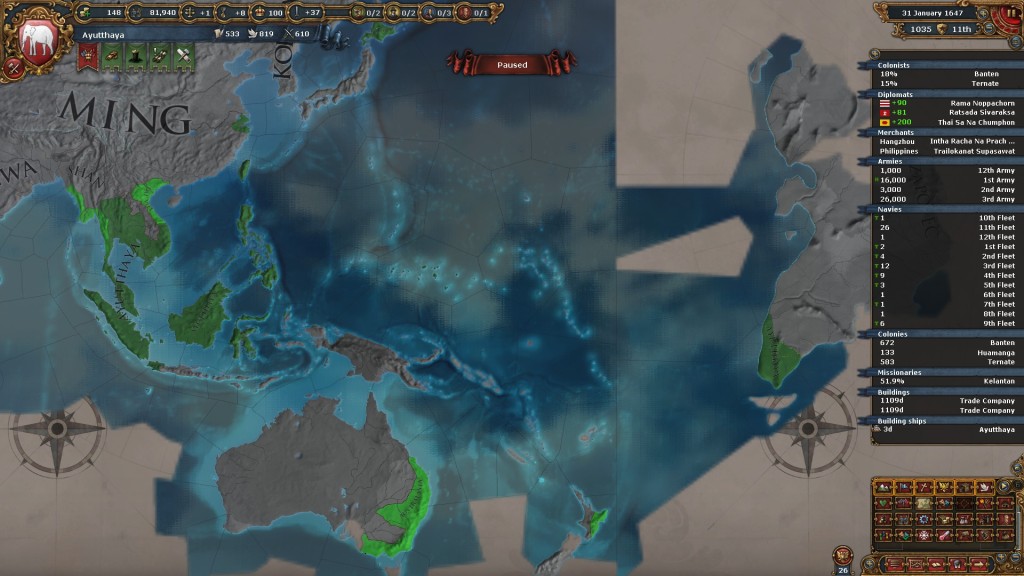
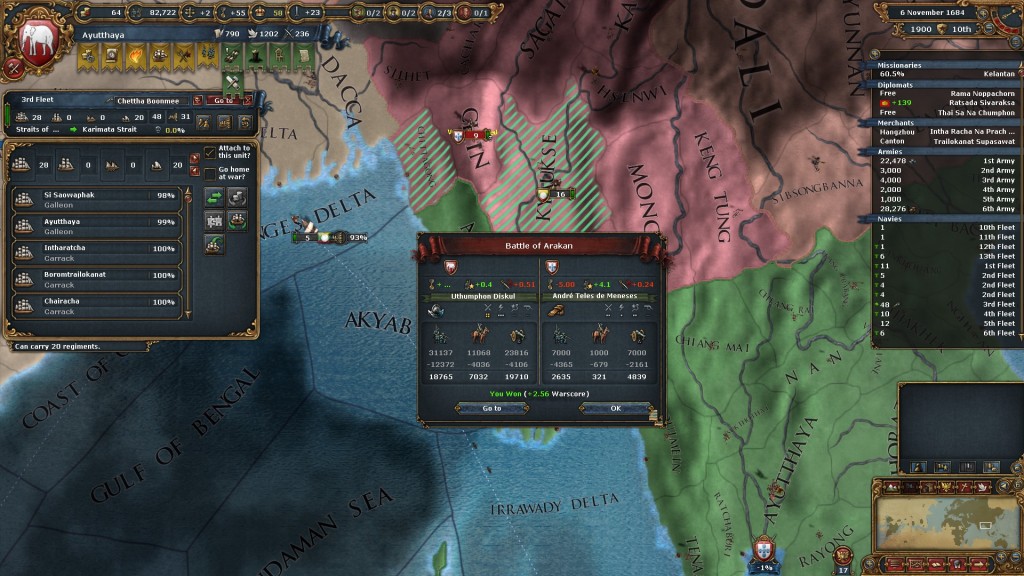
In the 1700s, a lucky personal union with Japan 4 brought that nation into the fold. And after three decades of Westernisation, the only painful part of the game 5, I could begin closing the technological gap with Europe:
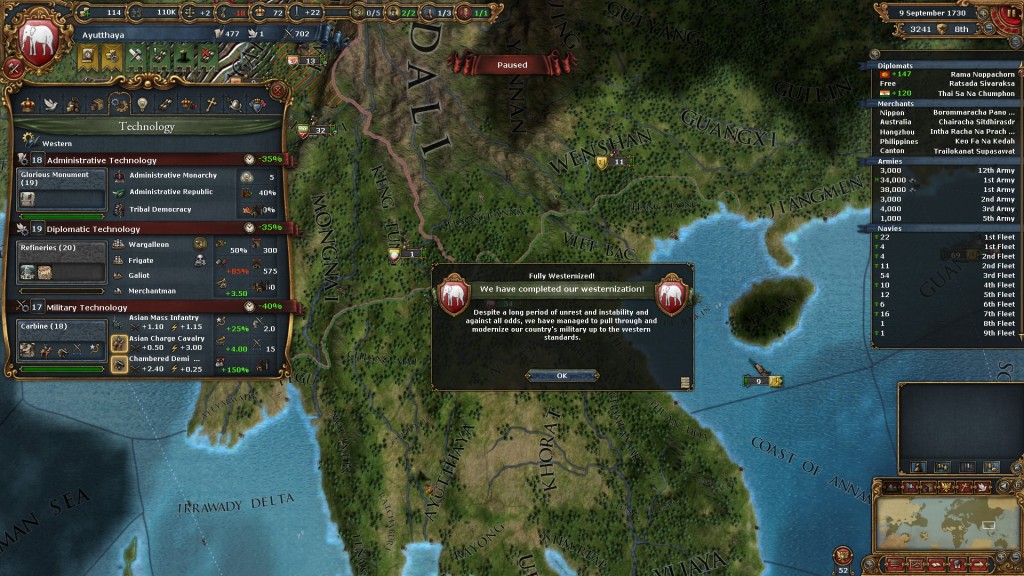
By the late 1700s and early 1800s, I had accomplished my goals:
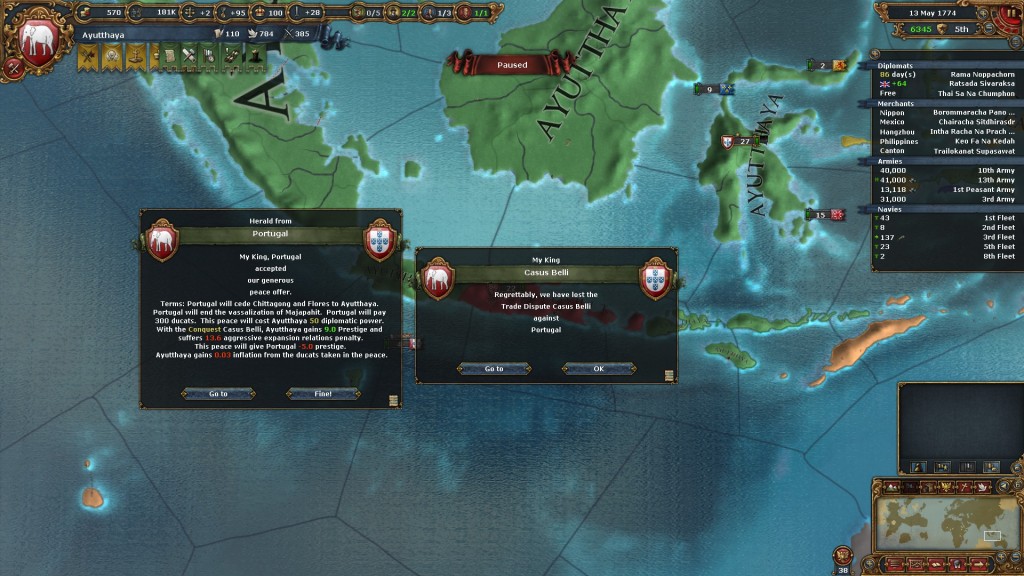
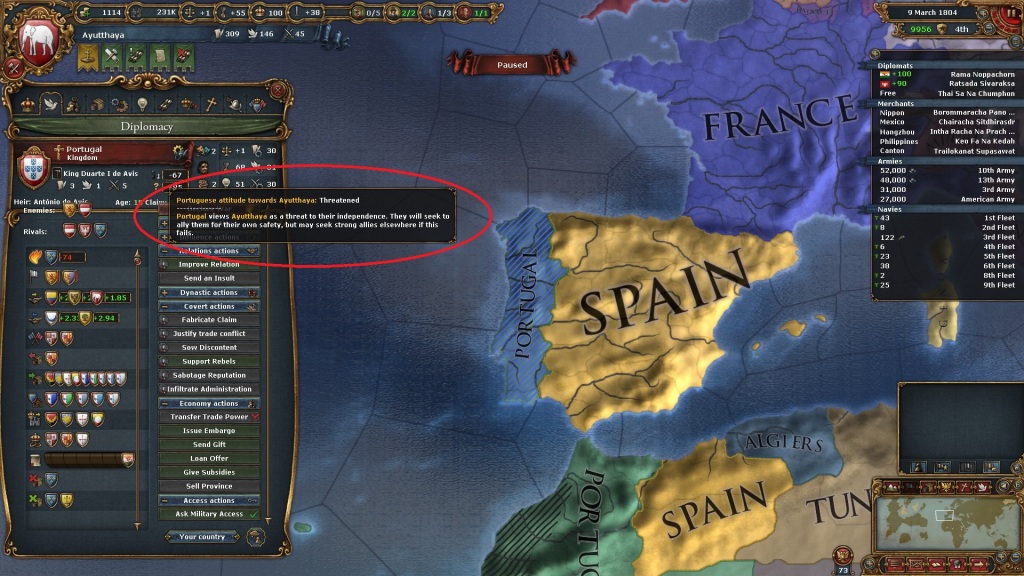
I finished with the world’s second-largest army, second-highest score (both behind France), largest navy, highest monthly score, and technology equal to the European powers:
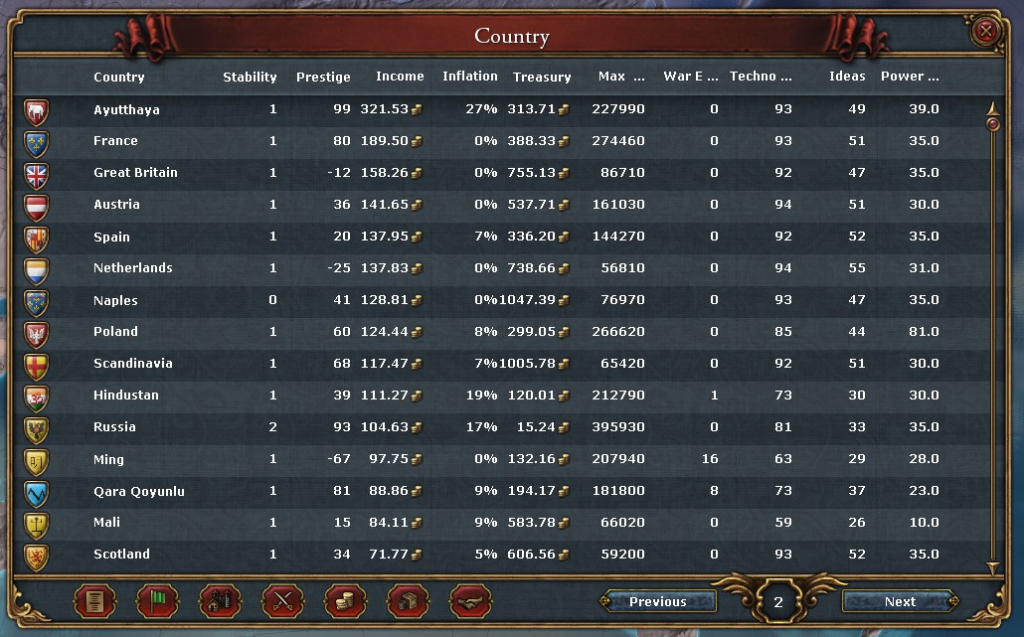
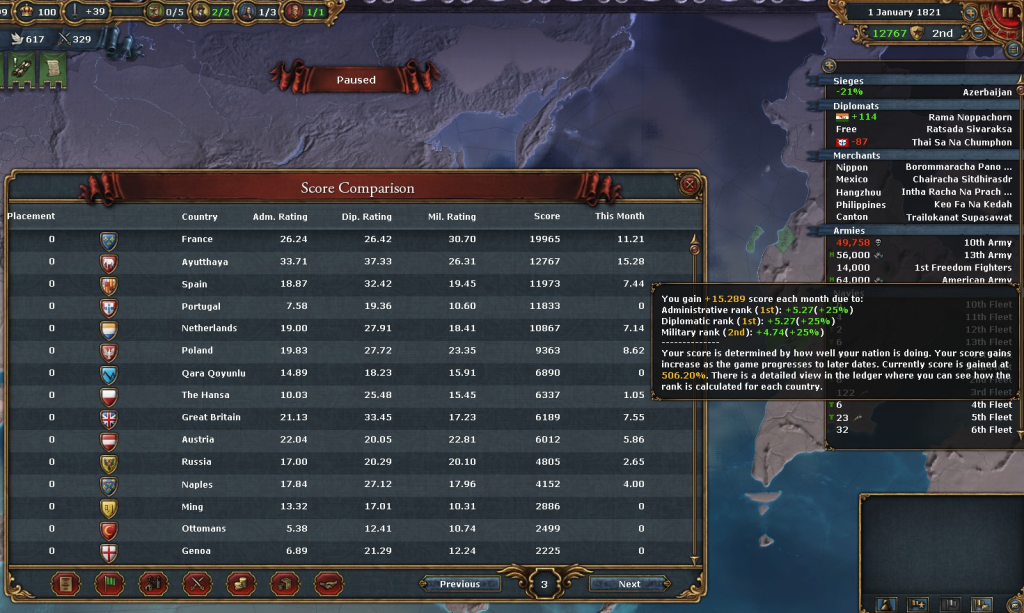
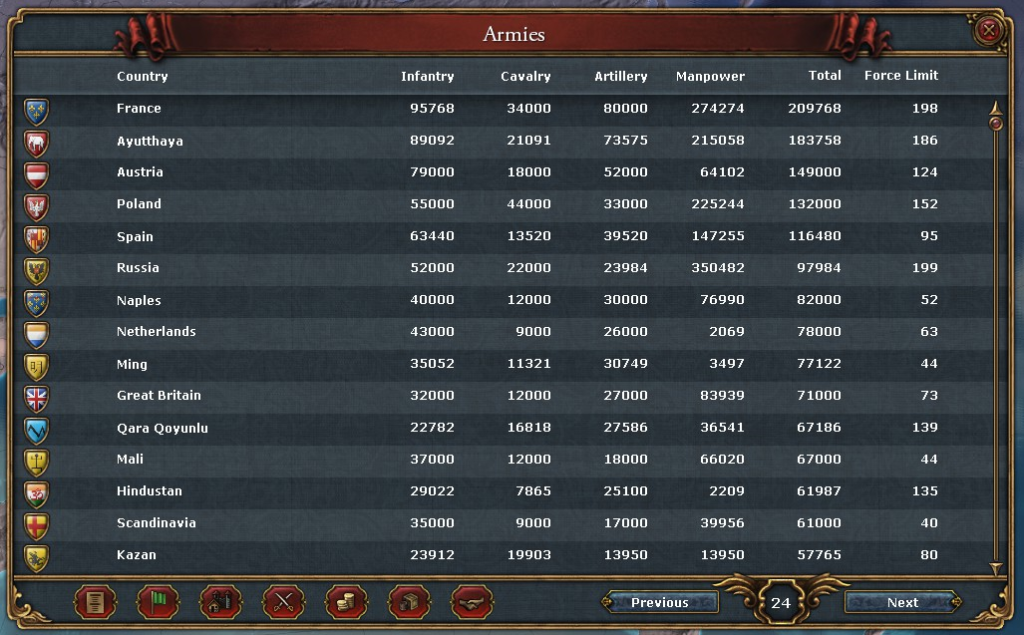
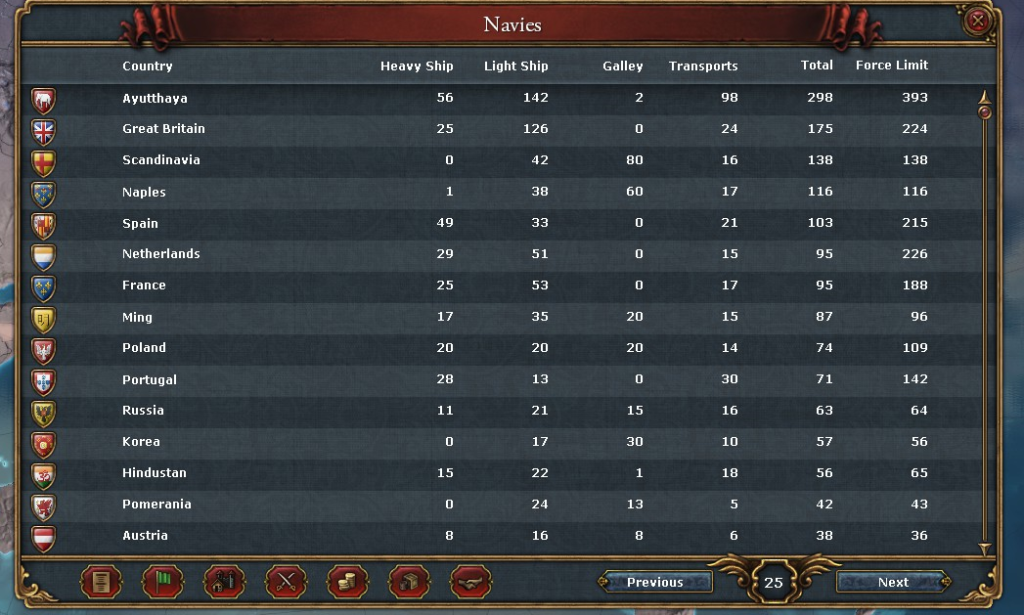
Other than a few hiccups, such as Westernisation, my Ayutthaya game stayed fun to the end. That’s rare for me – I don’t think I played a single EU3 game to 1821 6, and even last year’s England/Great Britain game started to drag near the end. I suspect this is because the Ayutthaya game had a clear sense of progression throughout. Not only did I become larger and stronger, as I moved into bigger ponds, I encountered bigger and scarier rivals: first the other Southeast Asians, then Ming, and finally Portugal. Working my way up into the Europeans’ league kept me busy for most of the game. By contrast, my England/Britain game was a 350-year attempt to contain France 7, and I fulfilled my main goals — colonise the Americas, send explorers around the world, grow rich from trade with China – well before time was up.
An interesting question is how far it’s possible to generalise from those two games, England and Ayutthaya. Is EU4 a better empire-builder if you play a small, non-European state, versus a European major? I suspect the answer is yes. The non-European minor should benefit from the same progression from minor to major to world power. The European major will hit its potential much earlier. And I think the Western European technology bonus produces better results if you do not play a European — that way the European colonialists become a formidable end-boss. Large non-European countries and small European countries probably sit somewhere in between.
Once the Art of War expansion is out, I will probably choose another non-European country for my next run. One possibility is Vijayanagar, in southern India. As with Southeast Asia, India houses many competing states and will eventually be in the Europeans’ firing line, and I had a fun trial run with the Indian sultanate of Gujarat. Another possibility is an East Asian state, such as Korea, Japan, a Manchu tribe, or perhaps even Ming 8 – can I head across the Pacific, grab California and Mexico, and become master of Asia again? Perhaps I’ll try somewhere inland, such as northern India or Central Asia…
There is a universalis beyond Europa. And I’d like to see more of it!
Paradox supplied review copies of Europa Universalis IV and the Conquest of Paradise and Wealth of Nations DLCs. I bought the Res Publica DLC out of my pocket.
- Conversely, the series has struggled to fit Ming China into its focus on interstate conflict. Before the final EU3 expansion nerfed Ming, its wealth and strength made it a monster. Watching AI Ming blob from Siberia to Sumatra in EU3, only to hit -3 stability and fall apart, is still one of the coolest things I’ve seen in a video game. ↩
- In EU4, all trade flowing from China and Japan to Europe has to either go overland, or take the sea route through Malacca. In our history, Portugal conquered Malacca in 1511 for exactly this reason. To quote one Portuguese observer, “Whoever is lord of Malacca has his hand on the throat of Venice.” ↩
- Fortunately, the European powers only ever deployed a small proportion of their militaries to Asia. I suspect they had bigger fish to fry back home. ↩
- This was doubly lucky – at first, they secured a personal union over me. I ended up reloading for separate reasons. ↩
- The problem with Westernisation is that it slugs the player with years and years of brutal random events – the key word being “random”. While I understand the designers were trying to represent political and social upheaval, look at it in terms of player psychology. When I watch my Westernisation meter slowly tick up, only to be repeatedly told that I can either lose progress or suffer a giant rebellion or stability hit, it feels as though the game is out to sabotage me. A better approach, I believe, would be flat, predictable maluses applied for the duration of Westernisation. It already drains monarch points and increases revolt risk. Why not also, say, an increase to stability cost, coupled with decreases to revenue and military tradition? This would feel less punitive and, I suspect, be more fun. ↩
- I tended to play EU3 as a time-travelling guardian angel: I’d jump into weak, endangered realms, spend 100-200 years defeating their initial tormentors, and then start another game. ↩
- Not easy, given France’s gold, manpower, National Ideas, and “lucky nation” bonus. I dislike lucky nations – from a gameplay perspective, it’s too blatant an AI cheat for my taste, and from an alt-history perspective, it makes EU feel too deterministic. Lucky nations are mandatory in ironman, which is the main reason I disabled that mode for the Ayutthaya game. ↩
- I did not enjoy my brief time with Korea in EU3. Ming’s dominance meant there wasn’t much to do close to home – I ended up picking fights in Southeast Asia. As Paradox will add nearby countries in Art of War, I’m willing to give Korea a second try, and I enjoyed my time with the Manchu in EU3 ↩
Discover more from Matchsticks for my Eyes
Subscribe to get the latest posts sent to your email.
1 thought on “Ayutthaya Universalis: Building an Empire in Southeast Asia”